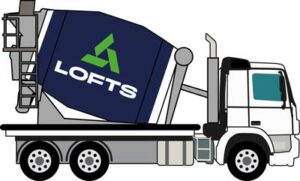Ready Mix Concrete
& Stabilised Sand
No order is too small for premium service.
Delivery Available Within 24 Hours.
Wholesales Prices.
Choose Your Truck Size

Mini Mix Truck (2.2m³)
Ideal for small loads and limited-access sites

Maxi Mixer (5.8m³)
Suits larger loads, often paired with concrete pumps.

Twin Steer Mixer (7.0m³)
Fits spacious sites with ample manoeuvring room.

Trusted in the Melbourne construction industry since 1979.
Elevating the standard for small concrete orders.
With our vast network of industry partnerships, we guarantee that your smaller concrete orders receive the spotlight they deserve.
By handling negotiations and coordination, we secure competitive rates and prompt deliveries on your behalf. This dedication is a cornerstone of our business, mirrored in our approach to quarry materials. We make certain that your project shines with the attention it truly deserves, proving that no order is too small for premium service.
Need only a few m³ of concrete?
Mini mix concrete is standard concrete that is delivered in smaller quantities, typically using smaller trucks designed for easy access to restricted areas.
This service is ideal for small repair jobs or smaller-scale projects where access is limited, or where the volume of concrete required is below 3m³, making the use of large delivery trucks unnecessary.

Stabilised Sand
Stabilised sand is a versatile construction material made by blending natural or recycled sands with cement in specific ratios. This mixture of sand, cement, and water creates a highly durable and permeable material ideal for various applications, including:
- Under-filling and infilling of pipes: Provides a stable and compacted fill.
- Bedding for driveways and patios: Ensures a solid base that can withstand heavy loads.
- Road construction: Ideal for levelling and creating a firm foundation.
- Base for slabs and floor: Offers a durable and reliable base for various flooring applications.
Stabilised sand is essential for projects requiring compacted or hardened fill, making it suitable for large commercial developments, residential housing, renovations, and new builds.
Words from our clients







Prices very competitive the main thing to me was the friendly people you deal with and treat you as a person not just a customer.
A company l would strongly recommend if you want what they have give them a call.


Important Information & Additional Fees
- At least 24 hours’ notice is recommended to secure your prefered delivery time and help us ensure our best service.
- Outer-Metro pricing is available upon request
- Additional or more specialised concrete mixes are available upon request.
- Short Load Fees: $80 per m3 under a 4m3 load.
- Waiting Time: 30 mins grace, then $3 per minute.(<4m3): $80 per m3 under a 4m3 load.
- Returned Concrete: < 0.4m3 returned = No charge, 0.4m3+ = From $150-$300* per m3, depending on the supplier used.
- Outer Metro Cartage Fee: $3 per m3 per km, delivered more than 15km from the nearest plant.
- Cancellations: Any changes must be made 90 minutes prior to delivery to avoid charges.
Skip Bin Hire
Lofts is proud to offer you highly competitive rates in Melbourne for skip bins. You don’t have to break the bank for top-tier service. With an emphasis on waste recovery, you’re opting for convenience, affordability, and an eco-friendly choice.
Crushed Rock
Lofts supplies crushed rock, crushed concrete and quarry materials from all major quarries and recyclers across Greater Melbourne, bringing you the most cost effective and sustainable product to suit your needs, no matter the project.
FAQ
What is the difference between standard concrete & high-strength concrete?
As above, standard concrete is used for more generic work e.g. slabs for houses or footpaths. High strength Concrete is designed to withstand heavier loads e.g commercial bridges and large buildings. High strength concrete provides greater durability.
Why is water content important in concrete?
The water-cement ratio significantly influences concrete's strength and durability. Too much water dilutes the concrete, reducing its strength and durability. The correct ratio ensures that the concrete achieves the desired workability and strength.
Can excessive water in the concrete mix affect its quality?
Yes, adding too much water to the concrete mix can significantly reduce its strength and durability. While a higher water content might improve workability, it dilutes the mix, leading to a weaker concrete structure and increased susceptibility to cracking and other damages.
What is the Summer/Winter/Spring Mix?
This refers to how much moisture is in the mix and is dependent on the weather. (i.e. summer mix has the most moisture as the weather would make it dry out quicker). If you do not specify a particular mix, the supplier will have a default for the day, depending on the weather.
What does the types of admixtures & additives include?
- Water-reducing admixtures: These reduce the amount of water needed to achieve a certain slump, improving the strength and durability of concrete without altering its consistency.
- Set-retarding admixtures: Used to delay the setting time of concrete, making it ideal for complex pours or in hot weather conditions to prevent premature hardening.
- Set-accelerating admixtures (“accelerator”): Increase the rate of early strength development, particularly beneficial in cold weather to reduce the risk of frost damage.
- Air-entraining admixtures: Introduce tiny air bubbles into the concrete, improving its workability and resistance to freeze-thaw cycles, crucial for outdoor concrete structures in cold climates.
- Superplasticisers: These are high-range water reducers that allow for a significant reduction in water content without compromising workability.
What is the difference between admixtures & additives?
Can admixtures & additives be used together?
Yes, admixtures and additives can be used in combination to achieve desired effects that a single admixture might not be able to provide. These are often referred to as speciality mixes, as the selection and proportioning of these materials is based on the specific needs of the project and the characteristics of the concrete mix. Examples of these are - Specialist Chemicals, Colour Pigments, Steel and Plastic. It is recommended to check with your concreter if any speciality mix or additives are needed.
What is an accelerator?
An accelerator is an additive used in concrete to speed up its setting time and early strength development, allowing for quicker construction and protection, especially in cold weather. It boosts cement hydration without harming the concrete's final strength and durability.
Accelerator is available in low, medium, high, or super high dose. They can be ideal in scenarios like morning concrete pours, with afternoon rain forecasts, to ensure quicker setting and prevent rain damage.
How is concrete tested for quality?
Concrete quality is primarily tested using the slump test for workability, and compressive strength tests on cylindrical samples. These tests help ensure the concrete mix meets the specified strength and consistency requirements for its intended use.
What measures can prevent concrete cracks?
Cracks can be minimised by managing the concrete mix to prevent excessive shrinkage, implementing proper jointing and reinforcement practices, maintaining an optimal curing process, and considering environmental conditions during placement.
Why is curing important for concrete?
Curing is critical to concrete's strength and durability. It involves maintaining adequate moisture and temperature conditions to support the chemical hydration process, which strengthens concrete. Proper curing can significantly increase concrete's long-term performance and resistance to environmental stresses.
How much notice is required to order concrete?
Usually, providing 1 to 2 days' notice works best, although we can often schedule concrete deliveries for the same day, if needed.
Can I return concrete if I have over ordered? (CS)
Yes, you can return up to 0.4m³ of concrete without any extra charges. However, returning more than 0.4m³ will result in additional fees. The excess concrete will be charged at a rate of $150-$300 + GST per m³, depending on the supplier used. These additional charges will always be communicated to you prior to them being applied.